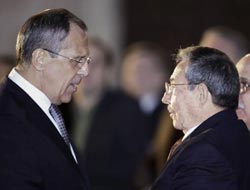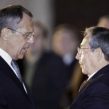
Sergei Lavrov Travels to Latin America
Publication: Eurasia Daily Monitor Volume: 7 Issue: 47
By:

During his presidential tour of Latin America in 2008, Dmitry Medvedev said that Russia’s Latin American policy was only beginning. Although the pace of these relations cooled in 2009, due to the global economic crisis, Moscow is now making good on Medvedev’s promise. On February 11-17, Foreign Minister Sergei Lavrov, toured the region making stops in Cuba, Mexico, Guatemala, and Nicaragua. Besides this tour, President Medvedev and other key officials, such as Deputy Prime Minister, Igor Sechin, have also been very active lately regarding Latin American policy. Medvedev hosted Guyana’s President, Bharrat Jagdeo, and announced that Russia has taken a strategic decision to intensify its links with Latin America, pursuing cooperation vital to the balance of forces and interests in the world and global problems like climate change (Rossiya 24 TV, February 2; Interfax, February 1, 2).
According to Lavrov, and other officials, two key areas where Russian ties to Latin America will be intensified are overall trade, and in particular “military-technical cooperation,” (arms sales) (ITAR-TASS, February 20; ITAR-TASS, February 17). Thus, this upgraded trade and economic relationship aims at weakening the US in the global arena, and is fundamentally political in its ultimate orientation.
Russian firms are moving forward in friendly countries like Ecuador, where the OAO Gidroproyekt Institute has joined a consortium with Mexican and Ecuadorian firms to build hydropower plants there (ITAR-TASS, February 18). Sechin is particularly active in the energy field. As Chairman of the Board of the Russian Consortium for Venezuela he has recently held talks with Venezuela’s Energy Minister, Rafael Ramirez, and is supervising the new Russian investment in the Junin-6 oil field that could produce 450,000 barrels per day (ITAR-TASS, February 1; Interfax, February 17; Interfax, January 31). GazpromNeft is also investing in Cuba (Interfax, February 2). Sechin publicly defended Lavrov against charges that Moscow is seeking to entice Cuba to recognize Abkhazia and South Ossetia, by offering Russian investment in return for such recognition. Instead, he claimed that Russo-Cuban relations are based on long-standing mutual ties that go beyond cold economic calculations (Kommersant, February 15; Havana Prensa Latina, February 18).
Of course, such denials immediately arouse the suspicion that this is indeed one motive, as was the case with Nicaragua after 2008 when it recognized these two provinces as independent states. Indeed, in Havana, Lavrov negotiated further economic agreements with Cuba, mainly in regard to economic infrastructure, and both sides agreed to reestablish a “strategic partnership.” This partnership entails more cooperation at the UN and other international organizations on the basis of their shared viewpoint. They also reached agreement on joint activities to shape a “polycenric world order based on equality and respect for the observance of international law” (an anti-American thrust to policy) (Ministry of Foreign Affairs of the Russian Federation (www.mid.ru) February 10; www.mid.ru, February 15; ITAR-TASS, February 10, 11).
In Guatemala, Lavrov discussed trade issues and signed an anti-drug agreement that includes the provision of “special equipment” to its security forces. In fact, Russia had offered to sell Guatemala arms in 2009. Without being specific, Lavrov also alluded to general military-technical cooperation between the two states and the Russian media pointed out that arms sales to Ecuador and Venezuela were also described as being designed to fight crime and drugs, and therefore we may see more arms sales to Guatemala (Guatemala City Prensa Libre, February 16; www.mid.ru, February 14, 18). In Nicaragua, Lavrov and President Daniel Ortega also stated their intention to combat drug trafficking and pointed to increased military-technical cooperation and overall trade and investments (ITAR-TASS, February 15). Indeed, Moscow is preparing joint military drills with Nicaragua, as a step beyond arms sales (RIA Novosti, February 15). Moreover, Nicaragua is apparently acting as a promoter of enhanced Latin American ties with Russia, particularly in such groupings as Chavez’s ALBA, an organization intended to promote his “Bolivarian revolution” throughout the region (www.mid.ru, February 16).
Finally, in Mexico, Lavrov found that the country also wants cooperation with Russia in the fight against drugs and crime as well as enhanced trade. Thus, Mexico is apparently interested in buying Russian helicopters (ITAR-TASS, February 16; EFE, February 17; www.reforma.com, February 17). Lavrov cited Mexico as a friendly state that is growing in importance and interested, as is Russia, in fighting terrorism, strengthening the UN, and promoting the observance of international law. He also noted Mexico’s membership in 2009-2010 as a non-permanent member of the UN Security Council, G20, and APEC. Thus, his discussions in Mexico dealt with the anti-drug and anti-crime issues, but also with collective efforts to overcome the global financial crisis (www.mid.ru, February 18, 19; ITAR-TASS, February 4).
In general, these talks clearly encompassed routine bilateral issues like trade, investment, tourism, and Russian assistance in the struggles against crime and the drug trade. In each country, specific issues such as Russian support for overturning the US embargo on Cuba, also arose. Nevertheless, it seems clear that Moscow’s underlying agenda is strategic. The economic relationships are a means to an end of eliciting Latin American support for Russian positions on key issues in world politics, while at the same time Moscow is cementing its relations with partners like Nicaragua, Venezuela, and Cuba, and increasing its overall arms sales offensive in Latin America. Inasmuch as many of those earlier arms sales to Venezuela in particular have aided drug running organizations like the Revolutionary Armed Forces of Colombia (FARC) (with Moscow’s undoubted knowledge), it is of considerable interest to see whether or not the continuing sales of arms allegedly under the auspices of anti-drug assistance, will actually be used to strengthen or in fact to weaken Latin American security and the interests of the US and its partners in the region.




